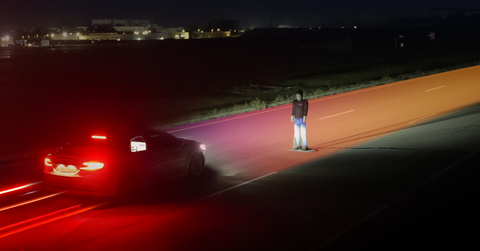A Fused-Thermal Imaging PAEB System Outperformed Existing State-of-the-Art AEB Systems During Tests of FMVSS No. 127 Requirements Coming in 2029
Teledyne FLIR and VSI Labs Testing Shows How Thermal Imaging Helps Vehicle Makers Meet Nighttime AEB Federal Safety Standards
Media Contact:
Keith Metz-Porozni
KGMP Strategies on Behalf of Teledyne FLIR OEM
keith@kgmp-strategies.com
Teledyne FLIR OEM, part of Teledyne Technologies Incorporated (NYSE: TDY), in collaboration with VSI Labs today issued test results utilizing the new Federal Motor Vehicle Safety Standard (FMVSS) No. 127 pedestrian automatic emergency braking (PAEB) testing scenarios. VSI Labs’ research vehicle, which included the latest automatic emergency braking (AEB) thermal camera from Teledyne FLIR OEM, successfully passed all tests, while three new 2024 vehicles failed two or more nighttime test scenarios.
This press release features multimedia. View the full release here: https://www.businesswire.com/news/home/20241210245198/en/

Only the pedestrian automatic emergency braking system with thermal imaging passed all nighttime tests, demonstrating superior detection capabilities independent of headlight performance. (Photo: Business Wire)
FMVSS No. 127 mandates the inclusion of PAEB systems in all passenger cars and light trucks with a gross vehicle weight of 10,000 pounds or less by September 2029. The new regulation requires that PAEB systems must detect pedestrians in various lighting conditions and at increased vehicle speeds. This is especially critical as pedestrian fatalities in traffic crashes remain near all-time highs, particularly at night, when 77.7 percent of pedestrian fatalities occurred in 2022.
The National Highway Traffic Safety Administration (NHTSA) demonstrated via testing last year that meeting FMVSS No. 127 requirements is achievable. The smallest and lightest vehicle of the five commercial-off-the-shelf (COTS) vehicles the agency tested, the 2023 Toyota Corolla Hybrid XLE, passed all PAEB tests at the maximum required speed. The other four COTS vehicles that NHTSA tested failed one or more of the low headlight beam nighttime tests, suggesting that increased speed and vehicle weight combined with decreased visibility challenge existing AEB sensor suites.
VSI Labs tested the performance of a thermal-fused PAEB system on a Ford Fusion Hybrid research vehicle and three current state-of-the-art 2024 COTS PAEB systems. The thermal-fused AEB sensor suite featured Teledyne FLIR’s latest longwave infrared (LWIR) automotive thermal camera, an automotive HD radar, and an automotive visible camera. All three 2024 COTS vehicles use a combination of radar and/or visible camera(s) and do not include a thermal camera. The test results revealed:
- Daytime PAEB Performance: Both thermal fused and COTS PAEB systems passed all daytime tests.
- Nighttime PAEB Performance: Only the thermal-fused PAEB system passed all nighttime tests, demonstrating superior detection capabilities independent of headlight performance.
- Thermal Active Pedestrian Test Mannequins (PTM): Commercially available heated, thermally active PTMs provide a realistic representation of a human thermal signature and are recommended for future PAEB testing protocols using thermal cameras.
“With the ability to see through darkness, shadows, headlight and sun glare, smoke, and most fog, as well as its unique capability to detect wildlife on the roadway, OEMs should consider integrating thermal cameras as a cost-effective method to meet FMVSS No. 127 requirements to increase real-world vehicle and pedestrian safety,” said Mike Walters, vice president, product management, Teledyne FLIR OEM. “With the ability to see well beyond the range of headlights, thermal cameras provide advanced warning extending braking distances, improving detection and false positive performance, and increasing deceleration comfort and safety.”
“VSI Labs’ testing showed that all three COTS vehicles failed at least two or more test scenarios at night, indicating that meeting the standard will be challenging using the current top-rated PAEB systems on all vehicle sizes and weights,” said Phil Magney, founder of VSI Labs, “Furthermore, real-world corner cases are potentially more challenging, emphasizing the value of automotive thermal cameras for true-positive and false-positive PAEB performance. VSI’s testing shows that thermal camera technology exists to help automotive manufacturers meet FMVSS No. 127 requirements by 2029 and make roads safer for pedestrians.”
VSI conducted all tests at the American Center for Mobility (ACM) in Ypsilanti, Michigan, on September 10 and 11, 2024, during the day and the night. A COTS thermally active (heated) adult pedestrian test mannequin (APTM), produced by 4activeSystems, was used to provide a thermal signature representative of an adult human.
To review the full testing details and results report, visit https://www.flir.com/oem/adas/fmvss-no-127-PAEB-test-report/
For more information about the Teledyne FLIR ADAS program, visit https://www.flir.com/oem/adas/.
About Teledyne FLIR
Teledyne FLIR, a Teledyne Technologies company, is a world leader in intelligent sensing solutions for defense and industrial applications, with approximately 4,000 employees worldwide. Founded in 1978, the company creates advanced technologies to help professionals make better, faster decisions that save lives and livelihoods. For more information, please visit www.teledyneflir.com or follow @flir.
About VSI Labs
Established in 2014, VSI Labs provides technical and applied research on the hardware, software, and connectivity systems that support advanced safety and automated driving systems. Today, VSI is considered one of the industry’s top advisors for supporting R&D and planning departments within major automotive companies and suppliers worldwide. For more information, please visit www.vsi-labs.com/.
View source version on businesswire.com: https://www.businesswire.com/news/home/20241210245198/en/
 Business wire
Business wire 











Add Comment